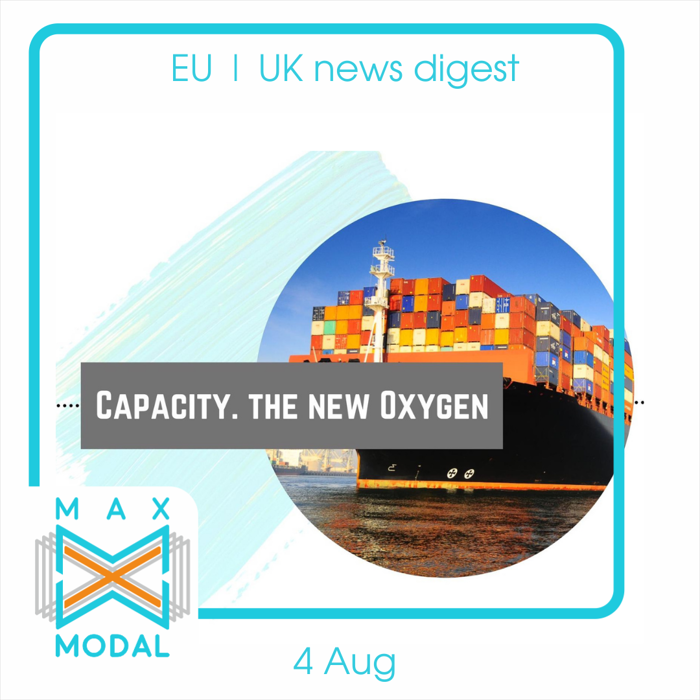EU | UK news digest. 4 Aug
Capacity wanted! The new scapegoat of the crisis.
For days, the boom in consumer demand has been considered the scapegoat of the industry’s misfortunes, when it turns out it is a capacity shortage. Recent data indicates, that only the US shows the unusually high demand, while in other regions it is average. However, shippers are fighting for sufficient capacity and it is a losing game mostly because of the delays caused by congestions. In February, almost 12% of global capacity was absorbed by delays. By April, this had dropped to 8.8% but has since increased to now being 9.6% in June 2021. The solution comes only from solving the blockages on the landslide. At the same time, there are still indications that customer demand is surging. From its perspective, Hapag-Lloyd has stated that it is going to make between $9.2 billion and $11.2 billion thanks to elevated demand. Maersk, in turn, predicts that the exceptional situation that everyone is witnessing now will continue until at least the end of 2021, reporting increased Ocean volumes of 15%.
The UK customs has completed a major milestone with the announcement by HMRC of the final implementation of the CDS system for processing Customs declarations. It is designed to provide a more secure and stable platform that has the capacity and capability to grow in line with the government’s trade plans. Among other benefits is the delivery of savings for the taxpayers.
Germany whose destiny has not been too sweet lately with all the disruptions caused by the floods is welcoming a government plan worth $2.97 bn to help the rail freight industry. The initiative has been approved by the EU Commission. The main objective is to reduce the charges paid by railway companies when accessing rail infrastructure in both the rail freight and the long-distance rail passenger sectors as well as to support healthy competition. Meanwhile, Belgium, Germany’s partner in misfortunes, is also working on the restoration of its railways after severe weather conditions. Four more lines have returned to operations, which means that the traffic is slowly but gradually returning to normal.
Sweden is among the countries that are not going to underestimate the input of rail either with its North Bothnia Line, the newest addition to the country’s rail freight network. The coastal line will be 270-kilometres long, connecting Umeå and Luleå considerably strengthening its rail freight. One of its biggest benefits will be increased capacity that is now almost equivalent to oxygen.
Faster, more efficient and, if possible, at lower cost are the main pillars of the recent rail advances. Following this leitmotif, Eversholt is planning to convert redundant passenger units into high-speed light goods trains for the sake of the fast-developing logistics and delivery market. The UK is among the first on the list of the adopters of this innovation since e-commerce is currently the fastest-growing retail market sector in Europe, and the UK is the third-largest market after China and the USA. Hanson follows suit in the UK direction and opens a new rail-served depot at West Drayton. On the Great Western Main Line, the depot serves construction industry customers in the capital and large infrastructure projects nationwide.
Silkway Transit has acquired four TEM14 shunting locomotives. They will be used for operations in the Dostyk-Alashankou border point, currently the busiest border crossing along the New Silk Road. Moreover, the company is working on other initiatives such as the development of a new high-speed flatcar that could transform transit between Russia and China.
However, not everything is so smooth for rail. With the blockage of the lines connecting Athus and Arlon because of the train carrying containers of phosphoric acid that came off the tracks, the situation has remained complicated. Although authorities rush to get operations back up and running, forwarders and shippers have also become increasingly critical of rail stakeholders, claiming that they have failed to keep customers in the loop on when services are likely to resume.
In an attempt to increase capacity, NSB Group has developed a new look boxship design. The deckhouse on the forecastle deck optimizes the container capacity and separates the accommodation from the IMO Type C LNG tanks, carrying gas.
Euroseas’ EM Spetses new daily rate of $29,500 has become a result of its new time charter contract. The company currently has a fleet of 14 vessels with a further two on order.
The intermodal shift washes over southern Serbia as it launches the construction of a new terminal in Niš amid to become a Balkan hub. The location is perfect for all the companies looking for new ways to export their products. The goal is also to offer a new gateway for new ocean carriers coming from Greek and Turkish ports.

